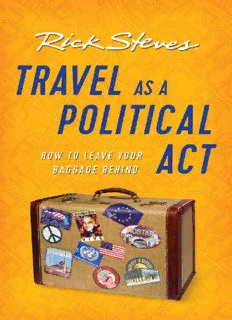
Most books are stored in the elastic cloud where traffic is expensive. For this reason, we have a limit on daily download.
Rick Steves TRAVEL AS A POLITICAL ACT Contents Index Introduction 1 How to Travel as a Political Act 2 Lessons from the Former Yugoslavia: War and Peace in Modern Times 3 Europe Unites: Successes and Struggles 4 Resurrection in El Salvador 5 Denmark: Highly Taxed and Highly Content 6 Turkey and Morocco: Sampling Secular Islam 7 Europe: Not “Hard on Drugs” or “Soft on Drugs,” but Smart on Drugs 8 Mission: Understand Iran 9 The Holy Land: Israelis and Palestinians Today 10 Homecoming Introduction On a visit to Turkey, I met a dervish. Dervishes—who are sort of like Muslim monks—follow Rumi, a mystic poet and philosopher of divine love. (I like to think Rumi and St. Francis, who both extolled the virtues of simplicity, would hit it off well.) They’re called “whirling dervishes” because they spin in a circle as they pray. The dervish allowed me to observe his ritual on the condition that I understood what it meant to him. The dervish led me to his flat rooftop—a peaceful oasis in the noisy city of Konya—where he prayed five times a day. With the sun heavy and red on the horizon, he explained, “When we pray, we keep one foot in our community, anchored in our home. The other foot steps around and around, acknowledging the beautiful variety of God’s creation…touching all corners of this great world. I raise one hand up to acknowledge the love of God, and the other hand goes down like the spout of a teapot. As I spin around, my hand above receives the love from our Creator, and my hand below showers it onto all of his creation.” As the dervish whirled and whirled, he settled into a meditative trance. And so did I. Watching his robe billow out and his head tilt over, I saw a conduit of love acknowledging the greatness of God. This man was so different from me, yet very much the same. This chance interaction left me with a renewed appreciation of the rich diversity of humanity…as well as its fundamental oneness. Experiences like this one can be any trip’s most treasured souvenir. When we return home, we can put what we’ve learned—our newly acquired broader perspective—to work as citizens of a great nation confronted with unprecedented challenges. And when we do that, we make travel a political act. I enjoyed perhaps my most profound travel experience ever on my first trip overseas. I was a 14-year-old with my parents, visiting relatives in Norway. We were in Oslo’s vast Frogner Park—which, then as now, is filled with Gustav Vigeland’s great stony statues of humans of all ages, shapes, and sizes. Immersed in this grand, chiseled celebration of family and humanity, I gained a new insight into my little world. I noticed how much my parents were loving me. Their world revolved around me. They would do anything to make me happy and help me enjoy a fulfilling life. At great expense to their meager family budget, they were making it possible for me to travel. Then I remember looking out over that park. It was speckled—like a Monet painting—with countless other parents…all lavishing love on their children. Right there, my 14- year-old egocentric worldview took a huge hit. I thought, “Wow, those parents love their kids as much as my parents love me. This planet must be home to billions of equally lovable children of God.” I’ve carried that understanding with me in my travels ever since. On that same 1969 trip, I sat on the carpet with Norwegian cousins, watching the Apollo moon landing. As Neil Armstrong took that first step on the moon, my relatives heard his famous sentence translated into Norwegian: “Ett lite skritt for et menneske, ett stort sprang for menneskeheten.” Sharing the excitement of everyone in that room, I realized that while this was an American triumph, it was also a human one—one giant leap for mankind indeed—and the entire planet was celebrating. As an idealistic young adult, I struggled with what I’d do with my one life. I wanted to work hard at something worthwhile and contribute to society. I wondered if it was really noble to teach wealthy Americans to travel. As a child, my earliest image of “travel” was of rich Americans on fancy white cruise ships in the Caribbean, throwing coins off the deck so they could photograph what they called the “little dark kids” jumping in after their nickels. They’d take these photos home as souvenirs of their relative affluence. That was not the kind of travel I wanted to promote. Even today, remnants of that notion of travel persist. I believe that for many Americans, traveling still means seeing if you can eat five meals a day and still snorkel when you get into port. When I say that at a cruise convention, people fidget nervously. But I’m not condemning cruise vacations. I’m simply saying I don’t consider that activity “travel.” It’s hedonism. (And I don’t say that in a judgmental way, either. I’ve got no problem with hedonism…I’m a Lutheran.) Rather than accentuate the difference between “us” and “them,” I believe travel should bring us together. If I’m evangelical about the value of travel, it’s the thoughtful and challenging kind of travel—less caloric, perhaps—but certainly much more broadening.
Description:
Change the world one trip at a time. In this illuminating collection of stories and lessons from the road, acclaimed travel writer Rick Steves shares a powerful message that resonates now more than ever. With the world facing divisive and often frightening events, from Trump, Brexit, and Erdogan, to